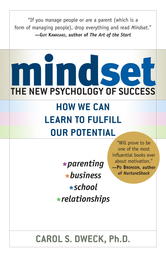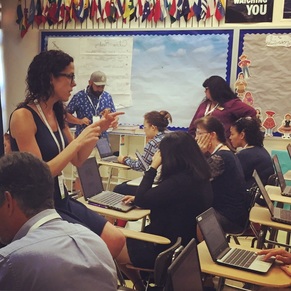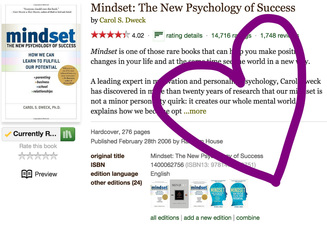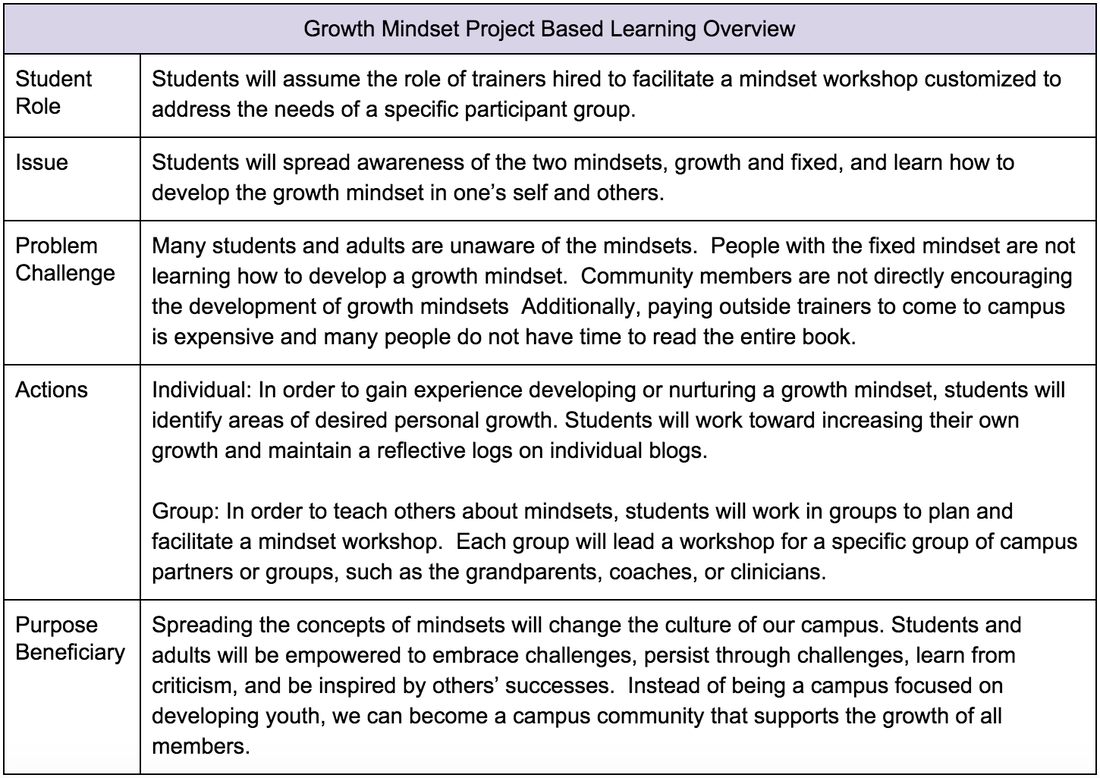|
Carol Dweck’s book Mindset: The New Psychology of Success asserts that humans have two mindsets: a fixed mindset is the belief that traits, such as intelligence and personality, are permanent and the growth mindset is the belief that traits can be developed. Dweck supports this claim by sharing her research, personal reflections, celebrity examples, and various anecdotes in the contexts of athletics, business/leadership, relationships, and parenting/teaching/coaching. Dweck’s purpose is to enable readers to understand the two mindsets in order to develop growth mindsets. Writing in an informal tone that explains psychology using simple vocabulary, supported by examples from clients to working professionals to pop culture icons, Dweck writes to a contemporary adult audience with little experience in the field of cognitive psychology.
Even though Dweck does not specifically discuss educational technology, Mindset has already positively affected my work. As explained in my previous posts, I was able to calmly learn from a failure by applying a growth mindset, I can identify mindsets in my students, and I feel prepared to share Dweck’s work with my students and campus adults. It seems that individuals with growth mindsets are better prepared to learn new technology and continue to learn as pedagogy and content change in response to technology. By helping my students, colleagues, and campus adults develop growth mindsets, I will empower them to be receptive to change and motivated to learn. To expand upon Dweck’s recommendation to teach others about mindsets and use feedback to encourage growth mindsets, I will follow and engage in the ongoing mindset conversation in social media. I am looking forward to learning more about how to respond to fixed mindsets and how to nurture growth mindsets.
1 Comment
The fixed mindset often appears in my classroom, compounded by the fact that many students have significant gaps in their education due to their experiences prior to, and within, the foster care system. Students are often resistant to even try to learn. These students will eagerly will show what they can do but avoid the challenge of learning new skills. The following are examples of how students’ mindsets appear in my classroom.
"I don’t!” As a simple assessment of my students’ experience in reading and writing, I often ask new students about their favorite books. I occasionally I hear a simple, “I don’t read.” John was one of these students. But, he did more than just not read--he did not want to do anything in English class. He said he did not “do English” and avoided writing tasks by distracting himself. He refused to read aloud. When pushed, he talked on and on about one novel he read in sixth grade. When given an independent reading assignment, he purchased the same book and asked to re-read it for high school credit. His behaviors clearly stated that he did not want to do the work because he did not know how, but he was unwilling to utilize the resources around him (including upperclassmen tutors and teachers’ assistants who offered to work with him in a private setting). John’s fixed mindset convinced him that he was incapable of learning more. He successfully read that one novel and clings to it. He did not pass my class. Currently, I am attempting a new approach by asking John to read a graphic novel with a teacher’s assistant. Even though, this reading task may provide some success, I can better support John by teaching him about mindsets and creating opportunities for him to grow. “It’s hard!” When Steven entered my class as a freshman, he was barely able to decode words. When reading silently, he was able to comprehend at a fourth-grade reading level, but he would pout or walk out of the room if asked to read aloud. A few weeks into the fall semester, I noticed that Steven would sneak into the back room during silent reading. It seemed as if he was trying to focus, but I soon discovered that he was actually using technology tools to improve his comprehension. He found audio clips of the novel that we were reading on YouTube and he was listening to them as he followed along in his text. In cooperation with the campus literacy coach, his houseparents, and upperclassmen tutors, we were able to provide Steven opportunities to read aloud. By the conclusion of his sophomore year, Steven was independently reading grade-level texts, especially teen romance novels. This spring, he passed the California High School Exit Exam on the first try and earned a 4.0 grade point average. He is open about his progress and loves to tell his peers about his improvement. Stephen’s commitment to working hard to improve his skills exemplifies his growth mindset and is becoming one of the most respected students on our campus. “I won’t even try!” The majority of my freshmen students have very little experience with expository writing--a few even claim to have never written any type of essay. When Manny asked “Do you want me to include the counterclaim in this body paragraph or do you want me to make a new paragraph for it?” I was taken aback. By inquiring about his educational experiences, I learned that he attended a middle school with high expectations. His eighth grade English teacher had emphasized expository writing. I told Manny that I was excited to read his work and challenge him to improve his writing. But, within a few weeks, Manny shut down. He stopped writing. He withdrew from the class. He became defensive when I attempted to help him. I set up a meeting with his clinician after school one day. Manny begrudgingly participated in the meeting, but became visibly upset after I kindly explained, “You are fortunate that you are entering high school with advanced writing skills. Your strong critical thinking skills are evident in your participation in class discussions. The door to college will be open to you. I am looking forward to helping you get there.” Sounds nice, but that conversation led to a six-month shut down. Even after many meetings with campus adults, Manny refused to participate in class. Manny has a fixed mindset and my comments about his innate intelligence and potential put too much pressure on him. When he faced a challenge in class, he stopped trying because it caused him to feel like I had lied--if he was smart he would have been able to accomplish the task without support. Fortunately, semesters end and courses can be retaken. Currently, Manny is beginning to accept support from adults and is pushing himself to earn high grades. However, I need to be mindful of his fixed mindset and praise his growth in skills instead of his talents. Impact Even though many of my students seem to demonstrate fixed mindsets, the adults at San Pasqual Academy can help them to develop growth mindsets. As Dweck explains, “Every word and action can send a message. It tells children— or students, or athletes— how to think about themselves. It can be a fixed-mindset message that says: You have permanent traits and I’m judging them. Or it can be a growth-mindset message that says: You are a developing person and I am interested in your development” (2008). This reinforced the previously mentioned practice shared by experienced campus adults; balance care with challenge. To support the growth mindset, we need to emphasize development. By doing this, we help our students to overcome trauma and the fixed mindsets frequently instilled in them by their previous caregivers. Works Cited Dweck, Carol (2006-02-28). Mindset: The New Psychology of Success. Random House Publishing Group. Kindle Edition.  After just reading the first few chapters of Mindset: The New Psychology of Success by Carol Dweck, I knew that I wanted to at least share the concepts of growth and fixed mindsets with my students. After reading, the chapter “Parents, Teachers, and Coaches: Where to Mindsets Come From?”, I realized that sharing the mindsets with my students would not be enough. If want mindsets to become part of the campus culture of San Pasqual Academy, I need to reach the adults, too. Bad Ideas Over the past few weeks, I have become increasingly aware of the popularity of mindsets among educators. Mindset is a popular hashtag, mindset infographics and articles are commonly tweeted, and many users list the mindset in their Twitter profiles. I have even received direct Twitter messages from a user stating that she is “on a mission to spread the growth mindset.” So, I was not surprised to discover that will minimal search effort, I was able to find an abundance of mindset resources. While collecting resources, I stumbled upon the upcoming conference Academic Mindsets : Promoting Positive Attitudes, Persistence and Performance hosted by Learning and the Brain. However, once I saw the registration price of $499, I scratched it off my list. My district supports professional development, but that seems a little pricey. Additionally, the conference is not until February 2016 and I want to bring mindsets to my school this fall. I also discovered many fee-based resources that support Mindsets, including Mindset Works’ Brainology Program, which costs $6,000 per school site. Again, I moved on. Next, I considered the idea of using the free mindset resources available online to create and facilitate a mindset professional development session for the school staff at my site. When I remembered our already packed professional development agendas, I thought of asking my district and our partner agencies to purchase copies of Mindset: The New Psychology of Success and host book clubs throughout the year. And then I remembered by preexisting list of special projects and decided that it would be unwise to start another project that would take my time away from directly supporting the learning taking place in my own classroom. Wait! Classroom? Project? Oh! I already know the perfect way to integrate the growth mindset into my campus! Rad Ideas Instead of using mindset as an add-on, I decided to directly integrate it into my curriculum. Since my site is switching to block schedules and trimesters this year, I already plan to implement at least one large problem-based learning unit into each course. I am going to use Mindset as one of these large projects; the students will read the book as an anchor text and participate in problem-based learning based on Dwek’s key concepts. Read Mindset Instead of a whole-class novel, I am going to teach a whole-class informational text. I will request a class set of Mindset: The New Psychology of Success from my district. I plan to customize the rhetorical reading and writing strategies utilized in the California State University’s Expository Reading and Writing Curriculum to help my students comprehend and analyze the text. We will focus on key ideas, craft and structure, and writing explanatory texts. Teach Mindset Instead of teaching about mindsets, I am going to have my students develop their own growth mindsets and teach others about mindsets. I will build the project by following the Buck Institute for Education’s Project Based Learning Project Planner template. The following is a summary of the project. Works Cited
Dweck, Carol (2006-02-28). Mindset: The New Psychology of Success. Random House Publishing Group. Kindle Edition.  Two weeks ago, I made my first conference presentation. I presented Writing from the Ground Up with Google Drive at the EdTechTeam Google Apps for Education (GAFE) Summit Riverside. When the session began, I was excited. The room was packed with almost fifty eager-to-learn participants. I pushed them to begin with an activity instead of just sitting idly and taking notes. I sensed their reluctance, but they jumped right in and began exploring a shared Google Drive folder containing writing process templates and samples. Then, it all blew up. Suddenly, the template folder was missing and copies of documents began popping up by the dozen. I attempted to just fix the problem by using revision history by identifying the folder thief and restoring the folder. This worked, but as soon as I moved the templates folder back to the shared folder another participant took the resources folder! And copies just kept appearing! It was a mess. I kept my cool. I smiled. I enlisted the support of a colleague who was in the session along with a few of the more experienced participants. But, it was too big of a mess to fix within a few minutes. And, every time I looked up someone was walking out the door! I took a deep breath. I abandoned my hands-on session that followed an inquiry model. I sat on a desk. I thanked the twenty remaining educators for their patience and began telling them how I use Google Drive to support the writing process. I showed examples and student work. A few actually seemed relieved to learn by simply listening and watching instead of creating their own documents. They were friendly and praised the tools and process I shared. I promised to locate the stolen folders and send an email containing new folder and instructions guiding them to make individual copies. I smiled as they left. But, behind the smile, I was frantically thought about how I knew better. I have been using Google Drive since before it was even called Drive. I knew shared folders were messy. I knew I should have used file>make a copy, but instead I decided to try something new in an attempt to have my participants collaborate and share their work. What was I thinking? Also, I hadn’t considered that many GAFE participants are complete beginners--even though I had labeled my session #beginner and #intermediate. I failed. My presentation was a flop. (I was secretly grateful these beginning GAFE users were also not very active on Twitter!) If this presentation had occurred a year and a half ago, it would have devastated me. I may have even begun crying or become visibly frustrated. I may not have been able to salvage the session. Even if I had pulled through, I would have been incredibly embarrassed. My mind and mouth would have been filled with frustrated criticisms and complaints. I would have felt like I was not good enough to present. I would have given up. At that time, I had what Carol Dweck, the author of Mindset: The New Psychology of Success, explains is a fixed mindset; I fell into the practice of “Believing that...qualities are carved in stone” (2008). At the time of the presentation, I was halfway through Dweck’s book, but I had already been unintentionally transitioning from a fixed mindset to a growth mindset for more than a year. The growth mindset, according to Dweck, follows “the belief that your basic qualities are things you can cultivate through your efforts” (2008). I have already had a year and a half of change due to a growth mindset. The growth began with small things like changing my eating habits, domestic routines, and exercise practices and intentionally returning to abandoned hobbies. As I began to have small successes in these areas, my confidence grew. I allowed myself to listen to the part of me that knew I was capable of growth. This led to even larger changes, including decreasing my commitment to extracurricular activities at school, ending a long-term relationship, purging hundreds of items from my home, closing my eBay business, and enrolling in a masters program. Reading Dweck's book has helped me to realize that I have a growth mindset. But, the way I handled this presentation flop showed more than just my willingness to learn. I allowed myself to fail without being hurt. As Dweck explains, “Even in the growth mindset, failure can be a painful experience. But it doesn’t define you. It’s a problem to be faced, dealt with, and learned from” (2008). The pages of Mindset was not my first exposure to the idea that failures create opportunities for learning. One of my close friends, Hunter Gluam (who has never even heard of Mindset) encourages growth mindset thinking. When I discuss a challenging situation or relationship with him, he says, “But, what are you learning from this experience? What is this person teaching you? If it hurts, identify the cause of the pain and be grateful for the pain. How is it changing you?” Without realizing it, Hunter has been encouraging me to seek challenges and take risks. Additionally, I recently read Kevin Brookhouser’s book The 20Time Project: How Educators and Parents Can Launch Google’s Formula for Future-Ready Innovation. Brookhouser encourages teachers to “set your students up to fail” because “Every student is counting on us to teach them failure so they can learn to persist, to get dirty, to take risks, to fail without giving up, to dust themselves off, and to keep making and producing no matter what. Additionally, the idea of providing opportunities for failure in classrooms is currently trending among the edtech community on Twitter. Because I have allowed myself to listen to the voices supporting a growth mindset, I was able to walk out of the session giggling as I sent a selfie to my friends to amuse them with news of my “epic fail.” At lunch, instead of pouting or complaining, I began debriefing the experience with my friends. My colleague, Cheryl Lynch (@clynchjccs), who was also presenting for the first time and I decided that we will need to practice presenting at small conferences before presenting at a larger local conference. We began immediately researching future conferences. My colleague and current professor, Jeff Heil (@jheil65), laughed at the story about my presentation and said, “Didn’t I tell you? Never share a folder. That’s like presenting rule number one. Always use file>make a copy. Next time.” Instead of being mad, I just laughed and harassed him for not telling me sooner. Later, an experienced presenter who I had just met that weekend, Jesse Lubinksy (@jlubinsky), advised, “You just need reps. It takes awhile. I was even nervous today as I began my large session today. Keep presenting.” I did not completely realize that day, but the people I chose to spend my time with also posses the growth mindset; they were able to see my story as a learning experience--not a definition of my ability. As I drove home from the conference, I excitedly decided that I would apply to present at the next available GAFESummit. I knew that preparation and time commitment would add to my busy schedule, but I wanted to push myself to improve. As Dweck states, “People in a growth mindset don’t just seek challenge, they thrive on it” (2008). I agree. My application to the GAFESummit Orange County was accepted. I will present Writing from the Ground Up with Google Drive again. And, this time, I will use file>make a copy. Works Cited Brookhouser, Kevin (2015-01-25). The 20Time Project: How educators and parents can launch Google’s formula for future-ready innovation. Kindle Edition. Dweck, Carol (2006-02-28). Mindset: The New Psychology of Success. Random House Publishing Group. Kindle Edition.  If you’ve taken a peek at my Goodreads account, you know that I have an extensive classroom library of high-interest young adult literature. As much as I love reading about teen love (Looking for Alaska), child abuse (Orphan Train), and dystopian societies (Maze Runner), I intentionally spend my nights reading these books because I understand the power of shared reading experiences and benefits of personal recommendations. So, when selecting my choice novel, I picked a book with positive reviews from five of my Goodreads friends and downloaded Catching Up or Leading the Way: American Education in the Age of Globalization. I started it. But, I also needed a new audiobook to listen to as I walk my dogs. I followed the recommendation of a friend and selected a book that also happened to be on Jeff Heil’s list. I must say, I have smart friends! I am totally in love with Mindset: The New Psychology of Success by Carol Dweck! I’ve already listened to a fourth of the audiobook. I meant for it to be a pleasure read, but I cannot stop pausing my walk to use the bookmark feature in Audible to record points I want to remember and jot down text-to-self, text-to-classroom, and tech-to-world connections. So, the audiobook wins! I am going to use Mindset for my choice book. I am looking forward to reading more, sharing my thoughts, and discussing the text with my smart friends. |
@npriesterA collection of my learning from SDSU EDL 680 Seminar in Personalized Learning Archives
August 2015
Categories |

 RSS Feed
RSS Feed